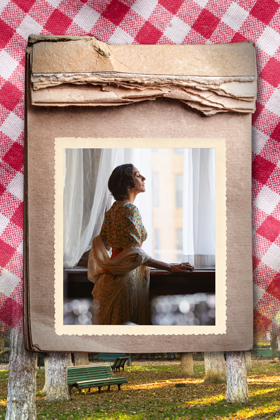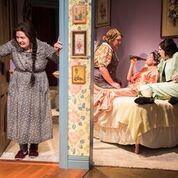

Four adult single women, one Sunday morning and afternoon in St. Louis. The year is 1937. This is the set-up for one of Tennessee Williams’s final plays, written just a few years before his death. The rarely produced A Lovely Sunday for Creve Coeur offers the last of Williams’s famously familiar Southern belles, trapped in her own idealistic version of reality.
In this case it’s Dorothea, a middle-aged school teacher with a crush on the handsome school principal. Unlike her predecessors, such as Amanda Wingfield, Maggie the Cat and Blanche Du Bois, Dorothea (Dotty) seems more down-to-earth. After all, she is supporting herself as a teacher. And she quickly recovers from the disappointment that inevitably falls on these women.
As the play opens, Dotty is doing “calisthenics” while waiting for a phone call from the school principal. This single man has filled her head with dreams that promise an escape from a life she clears hates.
Dorothea lives in an apartment belonging to a sturdy German roommate, Bodey. Bodey has read something in the daily newspaper that is sure to crush Dotty’s dreams. Much of the humor derived in the first scenes involves Bodey hiding the offending newspaper.
Thanks to Courtney O’Neill’s delightfully wacky set design, we see that the sisters live in an apartment that’s filled to the brim with odd knickknacks. Framed photos and memorabilia cover most of the gaudy rose-patterned wallpaper. The apartment’s lone telephone is prominently placed downstage.
Although “creve Coeur” is the French word for heartache, one discovers more humor than anguish in this sweet, funny play. For instance, Bodey is trying to play matchmaker between Dotty and Bodey’s twin brother, Buddy. He is never seen. Judging from Dotty’s description, Buddy doesn’t seem like much of a “catch.” For instance, when Bodey tells Dotty that her brother’s boss is taking notice of him, Dotty shoots back, “well, how could his boss not observe someone of Buddy’s size?”
Both the tall, thin Dotty (Kay Allmand) and the hefty, shorter Bodey (Kelly Doherty), do an excellent job at portraying this “odd couple” of roommates. Occasionally, under Leda Hoffmann’s direction, their characters swing a bit too far towards being caricatures instead of real people to which audiences can relate.
Things seem to settle down with the arrival of Helena (a well-heeled and wonderfully flustered Molly Rhode). Bodey guesses (correctly) that Helena is about to spill the beans to Dotty about the news article. So she contrives a variety of clever ways to keep the two apart. With admirable fortitude, she largely succeeds.
Although it’s not specifically mentioned in the play, one implicitly understands the limited career opportunities for women in 1937. Without a husband to care for them, or children to raise, women were pressed into a few professions regardless of their true passions.
Back in the apartment, Bodey tries to hold her tongue (unsuccessfully) while Helena is making veiled, unkind remarks about her decorating skills. Helena also comments, haughtily, about the apartment’s location (on the wrong side of the tracks).
As Dotty completes her workout in her bedroom, Bodey keeps Helena occupied by pointing out some of the apartment’s more comical “decorations.” One of them is a lifelike, stuffed canary. Bodey explains that she was so proud of her pet for outliving its 10-year lifespan that she took him to a taxidermist.
Helena quickly tires of this home tour. She explains to Bodey that she teaches at the same school that Dotty does. Furthermore, she has convinced Dotty to live together. She is there to get Dotty’s money as a down payment on a fancier apartment in a better neighborhood. This arrangement seems to benefit Helena more than Dotty, who has second thoughts about whether she can afford such an upscale address.
To complete the quartet of characters, one late arrival is the perfectly named Sophie Gluck (Karen Estrada). The kind-hearted Bodey is sympathetic to this disheveled woman, who is still grieving over the loss of her mother. Without her family or a solid grasp of English, Estrada demonstrates that Sophie is particularly isolated from the world around her. Estrada’s acting skills go far beyond what is required of this character, but she still shines in this role.
While it may not rank as an equal to Tennessee Williams’ better-known plays (Cat On a Hot Tin Roof, A Streetcar Named Desire and The Glass Menagerie), A Lovely Sunday for Creve Coeur still demonstrates Williams’s skill in exploring the female psyche.
Creve Coeur reflects the frustration, longing and loneliness of these women. Still, the play remains hopeful. “We must pull ourselves together,” Dotty says after finding out the truth about her insincere suitor. “That’s all that life seems to offer.”
